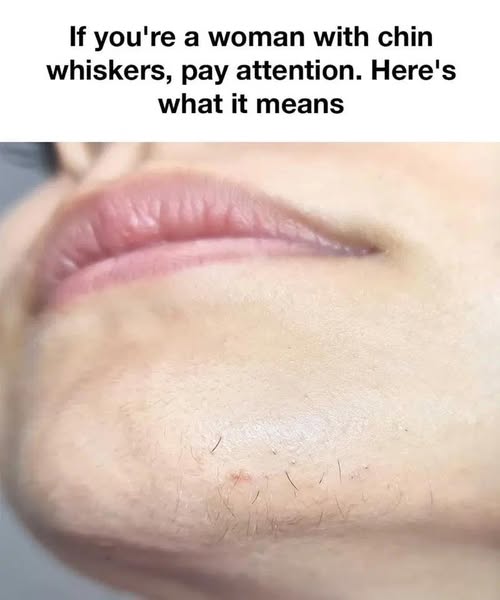
Chin Whiskers in Women: Why They Happen and What You Can Do About Them
If you’ve ever discovered a rogue chin hair in the mirror, you’re not alone. Chin whiskers in women are far more common than most people realize. From barely noticeable peach fuzz to darker, coarser strands, facial hair varies widely—and it’s nothing to be ashamed of. Whether it’s an occasional annoyance or a recurring concern, understanding the why behind chin hair can help you take control with confidence.
Why Do Women Get Chin Whiskers?
Chin hair in women can appear due to a combination of factors: hormones, genetics, age, and even medication. In most cases, it’s perfectly normal. But sometimes, it may point to an underlying health issue.
How Facial Hair Grows: A Quick Science Lesson
Just like the hair on your head, chin hair grows in cycles:
- Anagen: Active growth phase
- Catagen: Transition phase
- Telogen: Resting phase
The hormone androgen (which includes testosterone) plays a key role. While both men and women produce androgens, some women are more sensitive to them, leading to thicker or more noticeable hair.
Common Hormonal Triggers
Here are some of the top hormone-related reasons for excess facial hair:
1. Polycystic Ovary Syndrome (PCOS)
A common condition that causes hormonal imbalances and can lead to increased facial or body hair.
2. Menopause
Estrogen levels drop, and androgen levels may become more dominant, triggering chin hair growth.
3. Medications
Certain hormonal medications or steroids may contribute to unexpected hair growth.
Genetics and Ethnicity Matter Too
If your mom, aunt, or grandmother dealt with chin hair, chances are higher you might too. Genetics heavily influence hair growth patterns. Women from Middle Eastern, South Asian, and Mediterranean backgrounds, for example, may naturally have more facial hair.
Could It Be a Medical Issue?
Sometimes, sudden or excessive chin hair growth can be a symptom of a medical condition, such as:
- Adrenal gland disorders
- Cushing’s syndrome
- Hormone-secreting tumors
- Hypothyroidism
If you’re also experiencing symptoms like acne, rapid weight gain, or irregular periods, it’s best to consult your doctor.
Emotional Impact: More Than Just Hair
For many women, chin whiskers aren’t just a cosmetic issue. They can affect:
- Confidence and self-esteem
- Social interactions
- Mental health (including anxiety and depression)
- Time and money spent on grooming
- Physical discomfort from frequent hair removal
Societal beauty standards often amplify these feelings, making a very common condition feel isolating.
Changing Beauty Norms
Across many cultures, hair-free skin is considered the beauty ideal. But thankfully, the conversation is shifting. More women are embracing their natural features, and awareness around body positivity is growing. Whether you choose to remove facial hair or not, the choice is entirely yours—and valid either way.
Hair Removal: What Are Your Options?
Here’s a breakdown of the most popular methods:
✂️ Temporary Options
- Tweezing or plucking
- Waxing or threading
- Shaving
- Depilatory creams (chemical-based)
💡 Long-Term or Permanent Solutions
- Laser hair removal – Slows growth by targeting hair pigment
- Electrolysis – Destroys follicles permanently
- Prescription creams (e.g., eflornithine) – Slows hair regrowth
💡 Tip: Always talk to a dermatologist before trying new treatments—especially if you have sensitive skin or underlying conditions.
Natural Approaches and Lifestyle Tips
While these won’t stop hair growth entirely, they can help support hormonal balance:
- Maintain a healthy weight (especially important for PCOS)
- Eat a balanced diet rich in whole foods
- Try spearmint tea – Studies suggest it may help lower androgen levels
- Practice stress reduction through yoga, mindfulness, or meditation
When to See a Doctor
Make an appointment if:
- Facial hair growth becomes sudden or excessive
- You notice other hormonal symptoms (e.g., acne, irregular periods)
- You suspect a medical condition
A healthcare provider can perform hormone tests or imaging if necessary to pinpoint the cause.
Final Thoughts: You’re in Control
Whether you choose to remove chin hair, reduce it naturally, or wear it with pride, the choice is yours. Chin whiskers are more common than most people admit—and managing them doesn’t mean hiding them out of shame. It means doing what’s best for you.
With the right information, support, and self-compassion, you can navigate this with confidence.